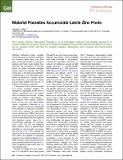Malarial Parasites Accumulate Labile Zinc Pools
Author(s)
Niles, Jacquin
DownloadNiles_Malarial parasites.pdf (134.0Kb)
PUBLISHER_POLICY
Publisher Policy
Article is made available in accordance with the publisher's policy and may be subject to US copyright law. Please refer to the publisher's site for terms of use.
Terms of use
Metadata
Show full item recordAbstract
The malarial parasite, Plasmodium falciparum, is an intracellular pathogen and partially dependent on nutrient uptake for survival. In this issue of Chemistry & Biology, Marvin et al. demonstrate that zinc is essential for parasite growth and that the parasite maintains substantial labile cytosolic and mitochondrial zinc pools.
Date issued
2012-06Department
Massachusetts Institute of Technology. Department of Biological EngineeringJournal
Chemistry & Biology
Publisher
Elsevier
Citation
Niles, Jacquin C. “Malarial Parasites Accumulate Labile Zinc Pools.” Chemistry & Biology 19, no. 6 (June 2012): 660–661. © 2012 Elsevier Ltd.
Version: Final published version
ISSN
10745521